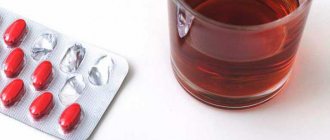General information
If a person coughs a lot, this symptom significantly worsens his life. During pregnancy , coughing causes the expectant mother great discomfort. Since immunity significantly weakens during pregnancy, a woman can catch a cold at any stage. Sometimes even short contact with a patient or slight hypothermia can trigger a cold or ARVI .
However, if we talk about the dangers of coughing during pregnancy, it should be noted that it is only a symptom of the disease, and can be evidence of a variety of ailments. This is a reflex reaction aimed at clearing the airways from bronchial secretions. Consequently, it is not the symptom itself that requires treatment, but the disease that provoked it. Sometimes a person coughs due to an allergic reaction that occurs to external irritants.
Pregnancy and cough - this combination can be a problem, because during the period of bearing a baby, especially in the early stages, a woman should not take effective expectorants or cough suppressants. By the way, most herbal remedies should not be taken during pregnancy. Therefore, those expectant mothers who prefer folk remedies when coughing so as not to harm the child also often risk harming the baby. After all, such drugs also have side effects.
Children's cough syrup should not be used either. Despite the fact that such medications seem safe at first glance, because they are given to children under 3 years of age, in fact, the drug approved for children can negatively affect the fetus.
Therefore, in order to protect the health of mother and baby, medications allowed for pregnant women should be prescribed by a doctor, as well as the regimen for taking them.
The nature of cough and accompanying symptoms in various diseases
The cough can be dry or wet, depending on whether the patient produces sputum. The nature of sputum differs in different diseases.
The nature of the cough also differs depending on the origin.
A cold cough is accompanied by a runny nose, pain or discomfort in the throat, headache, fever, and chest pain. A cough that develops at night can cause sleep disturbances, which further worsens overall health.
Cough due to diseases of the gastrointestinal tract (gastroesophageal reflux disease, gastritis with high acidity, etc.) is accompanied by heartburn, sour belching, nausea, vomiting, diarrhea, constipation, bloating.
An allergic cough develops upon contact with the causative allergen (immediate reaction) or some time after this (delayed reaction). This cough is often accompanied by nasal discharge, watery eyes, itching in the throat and/or nose, and skin rashes. Body temperature remains within normal limits.
Pregnant women should take medications only as prescribed by a doctor.
Why is coughing dangerous?
In most cases, cough is a sign of a bacterial or viral respiratory disease. Therefore, in the absence of proper treatment, the disease can gradually become chronic, and complications are also likely to develop. In such conditions, the likelihood of miscarriage , premature birth, and intrauterine infection increases. The risk of developmental defects in the baby also increases.
In addition, immediately at the moment when the expectant mother coughs, the tone of her uterus increases. And this condition threatens miscarriage and hypoxia .
If the expectant mother has low placentation or placenta previa, then due to strong muscle tension during coughing, bleeding from the uterus may begin.
And with toxicosis, coughing attacks can significantly increase the severity of nausea and aggravate the condition.
Why is coughing dangerous during pregnancy?
A cough during pregnancy should not be ignored, as it is most often the result of a viral or bacterial infection that affects the respiratory system. This condition is dangerous both for the patient herself and for the unborn child. An intrauterine infection may develop, premature birth or miscarriage may occur, the fetus may develop malformations, etc.
In addition, a pregnant woman may not know, but the cough reflex itself is dangerous. It helps to increase the tone of the uterus, which, in turn, threatens miscarriage, or oxygen starvation of the fetus and the development of various changes in its body against this background. If a deviation such as placenta previa or its low location is detected, then coughing during pregnancy can become a provoking factor for uterine bleeding. (
Treatment of cough during pregnancy
We will discuss below what you can drink when you cough in order to quickly cure the disease that caused it.
How to treat cough during pregnancy in the 1st trimester
The most important period in the process of fetal formation is the first months after conception. It is at this time that all systems and organs of the unborn child are actively formed. Accordingly, then there is a high risk of developing severe pathologies and fetal malformations, which can be caused by prohibited drugs. Of course, at this time it is better not to get sick at all, so the expectant mother needs to be very conscious about her health. But if a woman still gets sick, she can only take medications approved by her doctor. Only a doctor can tell you how to treat a cough during pregnancy, after conducting all the necessary research and making a diagnosis.
If the question arises about how to treat cough in the 1st trimester during pregnancy, the doctor will recommend the most gentle treatment methods that are safe for the woman and baby.
However, during this period all medications are only relatively safe. Sometimes a woman, without thinking about how to treat her throat during pregnancy in the 1st trimester, sucks lozenges. But even they contain active ingredients, the effect of which can negatively affect the fetus. Cough lozenges sold in stores contain extracts of eucalyptus, mint, as well as preservatives and flavorings that are not at all beneficial for the baby.
During the first trimester, it is acceptable to use some medications, as can be found in the table below.
Treatment of dry cough during pregnancy
| Herbal remedies | Homeopathic remedies | dietary supplements | Synthetic products |
| Can be used freely |
|
|
|
| Can be used, but there is little information on the effect on the fetus |
| ||
| Used only when the benefit to the woman outweighs the likely risk to the fetus |
|
How to treat a wet cough
| Herbal remedies | Homeopathic remedies | dietary supplements | Synthetic products |
| Can be used freely |
|
|
|
| Can be used, but there is little information on the effect on the fetus |
|
How to cure a severe cough during pregnancy in the 2nd trimester?
The second and 3rd trimester is the time when all systems and organs of the fetus are finally formed and mature. During this period, the child is actively preparing for birth and life after it. Therefore, in both the second and third trimesters, it is better not to take large amounts of medications.
However, if we talk about what can be used in the 2nd trimester if you need to get rid of a cough or treat a throat, then it should be noted that during this period the restrictions are no longer so strict. If necessary, the doctor may advise that pregnant women can also take some synthetic drugs for cough.
The tables indicate how to cure a cough in the 3rd trimester and in the second.
For dry cough
| Herbal remedies | Homeopathic remedies | dietary supplements | Synthetic products |
| Can be used freely |
|
|
|
| Can be used, but there is little information on the effect on the fetus |
| ||
| Used only when the benefit to the woman outweighs the likely risk to the fetus |
|
If the cough is wet
| Herbal remedies | Homeopathic remedies | dietary supplements | Synthetic products |
| Can be used freely |
|
|
|
| Can be used, but there is little information on the effect on the fetus |
| ||
| Used only when the benefit to the woman outweighs the likely risk to the fetus |
|
However, only the attending physician can correctly determine how to treat a dry cough during pregnancy or what to take if you have a sore throat.
What immunomodulators are possible in the 2nd trimester of pregnancy
Frequent colds in expectant mothers are explained by a pronounced decrease in the body's defenses. There is not enough immunity for two, so doctors often prescribe immunostimulating drugs to such patients.
As practice shows, any cough medicine for pregnant women in the 2nd trimester, enhanced with an immunomodulator, turns out to be several times more effective and faster - this is an important point, since a strong cough can provoke a miscarriage.
The list of approved drugs is determined by a specialist, and only he decides what is available for cough during pregnancy in the 2nd trimester.
Most believe that herbal stimulants are safe and expectant mothers can take them without restrictions - this is not true. Herbal immune stimulants such as eleutherococcus, lemongrass or ginseng are strictly contraindicated for pregnant women. They often cause surges in blood pressure, tachycardia, insomnia and severe allergic reactions.
Synthetic immunomodulators may not have a negative effect on the child, but research in this area is very expensive. Many manufacturers prefer not to carry them out, mentioning in the instructions that these drugs are contraindicated during pregnancy. Among the approved immunostimulants often prescribed to expectant mothers, several drugs can be noted.
Viferon
Combining immunostimulating and antiviral effects, it can be prescribed from the 14th week. It can also be used during lactation - safety has been confirmed by clinical studies. The dosage of the drug is prescribed by the doctor, based on the patient’s current condition and the degree of immune suppression. Viferon is often used for prophylactic purposes.
Limontar
This remedy belongs to the general strengthening means. It contains two active components - succinic and citric acids. The drug increases the body's nonspecific reactivity, improves adaptation and compensatory capabilities.
Beresh plus
Available in the form of drops with immunostimulating, metabolic and tonic effects. They not only perfectly complement cough medicine during pregnancy in the 2nd trimester, but also replenish existing deficiencies of macro- and microelements, and help restore mineral metabolism, including in cases of unbalanced nutrition. The drops help restore appetite, eliminate insomnia and increased fatigue, and normalize the emotional background.
Physiotherapy – treatment at home and in medical institutions
The safest way to treat cough while carrying a baby is physical therapy, since it is a non-drug method. This method is most effective for dry cough.
However, some methods still cannot be used.
Allowed methods:
- gargling;
- inhalation.
Should not be used:
- radiation treatment;
- banks;
- mustard plasters;
- foot baths;
- electrotherapy;
- hot baths.
However, expectant mothers should not once again visit medical institutions where a lot of patients are concentrated. Moreover, a number of physiotherapy procedures can be successfully carried out at home. Almost every forum where treatment problems for pregnant women are discussed contains advice on how to carry out inhalations or how to treat a throat with gargles.
Inhalations
To carry out inhalation, you can use a nebulizer or use a very ordinary teapot. The vapors are inhaled through the spout of the kettle, onto which a funnel twisted from cardboard is placed. To carry out inhalation, you need to adhere to some important rules:
- body temperature should not be elevated;
- the solution for inhalation should have a temperature of 30 to 40 degrees;
- the duration of inhalation is about 10 minutes, such “sessions” need to be carried out 3-6 times a day;
- After the session you need to not talk or eat anything for about half an hour.
The following mixtures can be used as solutions for inhalation:
- Dilute 50 g of baking soda in one liter of boiling water, then cool the mixture slightly.
- Dilute 10 g of honey in one glass of warm water. Whether honey can be used during pregnancy in any medicinal product depends on whether the woman has had allergic reactions to this product.
- Dissolve 10 g of pre-chopped garlic and eucalyptus leaves in one liter of boiling water. After this, you need to cool the mixture a little.
- Dilute 20 g of sage in one glass of boiling water and cool slightly.
Gargling
If a pregnant woman has a sore throat or just a sore throat, gargling is an excellent treatment method in this case.
You need to prepare this product before you start rinsing. When the liquid becomes homogeneous, it should be cooled. You need to gargle up to 8 times a day; one glass of the prepared solution is enough for one gargle. Rinse after meals.
Expectant mothers can use the following rinsing solutions:
- An infusion of 10 g of chamomile flowers poured into one glass of boiling water.
- A solution of half a teaspoon of baking soda in one glass of warm water.
- An infusion of 10 g of plantain leaves poured into a glass of boiling water.
- An infusion of 10 g of linden leaves poured into a glass of boiling water.
What can pregnant women do for a cough in the third trimester and what can’t they do?
The choice of medications for treating pregnant women is quite large. At first, it is better to use lozenges for resorption, which have minimal absorption into the systemic circulation and have a greater effect locally. In the second trimester, you can take mucolytics to more effectively expectorate sputum. At the end of pregnancy, most medications are allowed.
In most cases, treatment of cough in a pregnant woman is carried out at home, and only in those situations that the doctor may consider as threatening the health of the mother or child, hospitalization and treatment in a hospital are required. Therapeutic tactics depend on the cause of the cough.
When coughing against the background of otorhinolaryngological diseases and viral infections, rinsing the nose with saline solutions and gargling with antiseptic solutions are prescribed.
When you have an allergic cough, first of all you need to avoid contact with the substance, contact with which caused the development of the allergy. Antihistamines may also be required.
When coughing caused by acute respiratory infections, if possible, try to use soft medicines from herbal ingredients - preparations based on ivy, plantain, licorice root, marshmallow, thyme.
In the treatment of cough, preference is given to herbal preparations
In some cases, there is a need to take antibiotics (for example, in severe forms of bronchitis), the doctor will select those that will not harm the health of the mother and baby.
Massage, physical therapy, and breathing exercises can be prescribed as auxiliary methods.
Drinking regime
Drinking plenty of fluids is recommended. Drinking warm liquid helps to liquefy bronchial secretions and speed up their removal, moisturizing the mucous membranes of the respiratory tract.
Patients can use:
- Tea with lemon;
- tea with honey;
- compotes, juices, fruit drinks and berries;
- mineral water;
- warm milk mixed with alkaline mineral water in a 1:1 ratio.
If a pregnant woman has edema, fluid intake is usually limited; in this case, the drinking regimen is adjusted by the doctor taking into account the existing clinical signs.
Inhalations
Local agents are safer than systemic ones, so they are often prescribed by inhalation to treat cough in pregnant women. This method is also good because it allows you to deliver the medicine directly to the area of inflammation.
In addition to being safer, they are also significantly more efficient. The advantages of inhalation using a nebulizer include the possibility of using medications that lose their effectiveness when heated, as well as the absence of the risk of the patient receiving burns to the skin and mucous membranes.
Antimicrobial, expectorant, mucolytic, anti-inflammatory drugs, alkaline mineral water, saline solution can be used for inhalation.
Carrying out inhalations requires compliance with a number of rules:
- You should eat no later than 1 hour before the procedure and no earlier than 1 hour after it.
- During the procedure, you should inhale through your mouth and exhale through your nose.
- During inhalation you should not talk or engage in any other activities.
- After inhalation, you should not go outside in the cool season for 1-2 hours.
- In the first hour after inhalation, you should not talk or sing loudly.
- The nebulizer must be washed after each procedure (in accordance with the operating instructions)
- If the patient’s well-being worsens during inhalation, the procedure should be stopped early and consult a doctor.
Folk remedies
In the 3rd trimester of pregnancy, cough should also be treated at home with folk remedies under the supervision of a doctor, since some natural ingredients can negatively affect the course of pregnancy.
To strengthen a woman's defenses during pregnancy, it may be recommended to use decoctions and infusions that include rose hips, sea buckthorn, cranberries, and viburnum.
If you are not allergic to bee products, natural remedies with honey can be used, since it has many beneficial properties, including:
- has an anti-inflammatory effect;
- softens the mucous membranes of the throat;
- relieves attacks of dry cough;
- improves sputum discharge during wet cough.
Warm milk with honey is one of the safe and useful remedies for easing a cough.
The most popular recipes include:
- Honey with milk. A teaspoon of honey is dissolved in a cup of warm milk (not higher than 60 °C). For a severe dry cough, you can add a little butter to the milk and honey.
- Milk with figs. 1-2 pieces of figs are poured into 1.5 glasses of milk and boiled for 20-30 minutes, then allowed to cool and brew for 1-2 hours. Warm milk is drunk several times a day, and the figs extracted from it can be eaten.
- Lime tea. Brew a few linden inflorescences (about 5 g) with 200 ml of boiling water, let it brew for 5-10 minutes, drink during coughing attacks.
- Radish juice with honey. Wash the black radish thoroughly with a brush, cut off the top, remove the middle, making a depression with a volume of 2-3 tablespoons. Place a tablespoon of honey in the cavity and leave for 6-8 hours. Take the released red juice, mixed with honey, a dessert spoon 5 times a day. One radish can be used to prepare several servings of medicine.
What is prohibited
During pregnancy, it is forbidden to use warm compresses, mustard plasters, cups and hot foot baths.
Traditional methods for treating cough during pregnancy
You can learn about what you can drink for a cough during pregnancy from numerous traditional medicine recipes. However, even when talking about traditional methods of treating an expectant mother, you need to know that you should consult a doctor about what you can take.
In addition, it is important not only to know what to drink, but also to clearly monitor how the body perceives this or that treatment method. After all, sometimes even a seemingly ordinary radish with honey can cause undesirable effects if an allergic response develops.
Products with honey
Honey products can be used both externally and internally, provided that allergic to bee products. After all, honey is a strong allergen, and if any negative effects occur, its use should be stopped.
The use of honey internally helps dry cough gradually become productive. However, you can also use products with honey when it is wet. This treatment will help speed up the process of clearing the bronchi from mucus.
External use
- You can rub the chest area with honey - this procedure is carried out in the morning and evening.
- At night, you can put compresses on your chest using warmed honey. The compress is covered with cling film.
Application internally
- Three times a day before meals you need to slowly dissolve 1 tsp. honey, slightly warmed.
- Honey can be added to tea and other drinks - 1 teaspoon per glass of liquid.
- You can prepare a remedy from honey and black radish juice (1:2), which you drink three times a day, 2 tbsp. l.
Onion garlic
These are very strong natural antiseptics, the phytoncides of which effectively destroy bacteria and viruses. Therefore, both onions and garlic can simply be cut and placed indoors to ensure air disinfection. If you put several cut cloves of garlic and onion on plates, you get the so-called indirect inhalation.
You can also use onion and garlic juice separately. To get juice, you need to chop onion or garlic and mix with 1 tbsp. l. honey After half an hour, strain the released juice and take 1 tsp several times a day.
As for whether pregnant women can eat garlic, there are different opinions. After all, some experts claim that it can increase the tone of the uterus and also cause allergic manifestations. But still, most doctors agree that it can be consumed in very small quantities.
Milk
You can soothe a throat that is inflamed due to illness with warm milk. It will also help cope with coughing attacks and calm the nerves.
Milk should be drunk in small sips, it should be warm.
- If you mix it with alkaline still mineral water (1:1), then this mixture will promote the separation of phlegm.
- You can boil milk with sage (1 tablespoon of herb per 200 g of milk). Drink 1 tbsp before bed. l.
- A drink made from milk and figs helps with colds. To prepare it, four dried figs are boiled in half a liter of milk until it turns brown. Drink 100 g of this product warm three times a day.
How to treat cough during pregnancy: safe medications
Pregnancy is a wonderful period for a woman. If she is desired, all 9 months pass in a positive mood. There are actually many advantages of pregnancy, for example: easier work at work and at home, a daily walk, sometimes even with your loved one, dreams of a future child, talking with him and so on. But along with the advantages, all 9 months are fraught with a lot of life-threatening situations for the mother and baby. We are talking about various diseases that a pregnant woman suffers at any stage.
For a maturing baby, it is extremely important that nothing interferes with the formation of its main organs, especially the nervous system, intrauterine development and growth. After all, during this period all the cells, systems and functions of organs are formed. Almost the entire life of the child depends on the correct behavior and way of life of the mother during this period.
If a woman does not take care of herself and is at risk of contracting any infection, this can end disastrously for the fetus. For example, a disease such as rubella leads to fetal death. There are also many other infectious diseases that will certainly lead to a delay in the maturation of all body systems of an unprotected baby.
A cough in itself does not cause obvious harm to the health and development of the fetus. But there are some nuances that can be dangerous for a woman during this period. If a dry cough appears during pregnancy, it must be treated immediately, since sputum is not excreted and is absorbed into the blood, gradually reaching the child.
In addition, a dry cough may indicate diseases such as bronchitis, pneumonia, tuberculosis, and so on. With such a cough, you should definitely consult a doctor to determine the diagnosis and receive appropriate recommendations. A cough of any kind at the beginning of pregnancy can also be dangerous, since by trying to clear the throat, a woman can provoke the threat of miscarriage.
If it is not possible to immediately consult a doctor, you need to find out what cough remedies can be used during pregnancy. In this case, it is very important to choose the right drug or treatment method. After all, there are medications that under no circumstances should be used for a specific period. The mildest and safest way to cure a cough is to use traditional medicine recipes.
If we divide cough into types, we can distinguish two main ones: dry (non-productive) and wet (productive). The first, due to the lack of sputum production, does not perform its main function - protective. Most often, it indicates the occurrence of the following pathologies: laryngitis, viral infections, tracheitis, pleurisy, pneumonia, bronchial tumors.
In order to transform this type of cough into a productive one with sputum production, it needs to be treated as quickly as possible. Why such urgency? A dry cough during pregnancy can cause bleeding if the baby's position and placenta previa are low. If such a cough occurs, the doctor may prescribe medications based on herbs or with a chemical composition that is acceptable in this situation.
If signs of ARVI appear at the beginning of pregnancy, and even more so a cough develops, you should immediately consult a doctor. This period is very important due to the fact that in the first 3 months cells actively divide, creating organs and systems of the child’s body. Let's imagine the situation from the inside: in a perfectly protected warm place, inside the mother, the process of forming legs, arms, nose, sponges, and internal organs is actively taking place day and night.
If a cough occurs during pregnancy (1st trimester), you need to take a very responsible approach to its treatment, because at this time the formation processes slow down. In addition, the supply of nutrients and vitamins to the child is difficult. If this condition continues for a long time, some organs may not form properly or not fully form.
- Inhalation is an effective remedy for dry as well as wet cough.
- Compresses. There are effective recipes:
- compress with honey (spread liquid honey on your chest, cover with plastic and wrap yourself in something warm);
- from potatoes (boil a couple of potatoes, crush them and, wrapped in plastic and a knitted rag, apply to the chest for 10 minutes);
- compress with cabbage and honey (take a large leaf of cabbage, dip it in boiling water so that it is not cold, then anoint it with honey and sprinkle with a small pinch of salt, then put it on the chest, cover with plastic and a warm blanket), this compress can be done on all night long.
Very often there are medications for which the 1st trimester of pregnancy is a contraindication. But already in the 2nd and 3rd trimesters they can be used. Of course, even at this stage of a child’s development, some drugs pose a threat, but the range of cough suppressants has already expanded.
Naturally, the doctor prescribes medications. Most often, pregnant women can use for treatment those medications that are allowed to children from birth. Cough during pregnancy (2nd trimester) can be treated with medications such as Mukaltin, Gerbion, Prospan, Pectolvan, Gedelix. Of traditional medicine, all those that can be used in the first trimester are suitable.
When a cough occurs at this stage, the woman begins to worry very much, because the tone of the uterus may be more frequent, and therefore, the possibility of premature birth is possible. Of course, I wouldn’t want to infect the baby at birth when the disease arrived at 9 months. Therefore, the question of quick and harmless treatment is very important, because every expectant mother wants to quickly cure a cough during pregnancy.
The 3rd trimester is good because the range of drugs and treatments has already expanded significantly compared to the first. During this period, you can take more necessary medications without harming the fetus. Along with taking medications, folk remedies are actively used during pregnancy. Cough at this time can be treated in the following ways:
- Taking medications such as "Sinekod", "Bronchicum", "Stoptussin", "Fluditek", "Fluifort", "Ambrobene", "Sinupret", "Mukaltin", "Bromhexin", "Pectusin", "Linkas". These drugs contain special chemicals that should be taken with caution in the first trimester of pregnancy.
- The use of herbal preparations: licorice root syrup, marshmallow root, Prospan, Pectolvan Ivy, Doctor MOM, Breast Elixir, chest collection, dry cough syrup.
Thermopsis herb, drugs “Bronholitin”, “Alex Plus”, “Glycodin”, “Terpinkod”, “Tussin Plus”, “Codelac”, “Codterpin” cannot be used for treatment. Before starting treatment, you should definitely consult a doctor about the benefits/harm for the baby and not self-medicate.
An excellent alternative to medications are foods that will help treat cough. Hot milk with butter and soda is actively used at night (1 glass: 1 tsp: 1/3 tsp, respectively). Many people also use honey for coughs during pregnancy. If you are not allergic to it, you can add it to tea, milk, just eat it, put it on lemon and suck it. In addition to the listed remedies, you need to include natural vitamins in your diet - more fruits and vegetables, then no illness will affect you.
In any case, if you compare dry and wet cough, the latter always indicates a healing process. Any cough is undesirable in such an “interesting” position. With a dry cough, it is more difficult to diagnose the cause of its occurrence, so it is fraught with more dangers. A wet cough can provoke the threat of miscarriage with increased expectoration, but it is the first step towards a healthy woman. All specialists are in a hurry to convert a dry cough into a wet one, since it clearly indicates good treatment results.
Advantages of herbal medicine
In the treatment of cough, herbs can be used both for oral administration and for rubbing, inhalation, rinsing, and so on. Herbs for coughs during pregnancy are the most harmless way to normalize your condition. Herbal medicine can be used as an effective additional method of treating cough. After all, herbs cannot replace some of the chemicals necessary for treatment, and if they can, then in very large quantities and over a long period of time.
Inhalation can be done using a special nebulizer or the old-fashioned way - using a kettle or saucepan. For this you can use potatoes, mineral water, garlic and onions, saline solution, honey, herbs. But you need to be careful with aromatic oils. Eucalyptus is often used for inhalation; this method is very effective.
Some people are skeptical about gargling when coughing. But in vain, because in the rinsing process not only the tonsils are involved, but also the larynx. The medicinal substance is transported lower to the trachea and bronchi with the help of saliva, where it is absorbed and has a therapeutic effect. Rinsing should be done between meals. To do this, you can use herbal preparations consisting of at least two of the following elements:
- sage;
- chamomile;
- coltsfoot;
- calendula;
- plantain;
- eucalyptus;
- raspberries.
Any cold is undesirable when carrying a baby, and problems with the bronchopulmonary system in particular. After all, there may be completely different reasons behind this, and some of them negatively affect both the baby and the placenta. In order to get rid of the disease as quickly as possible, you need to know which cough remedy can be used during pregnancy.
- effective treatment of wet cough can be provided by such medications as Doctor IOM, Theraflu, Gerbion, Mucaltin, Linkas, Prospan, Gedelix;
- for a dry cough, Falimint or Stodal are usually prescribed, as well as Stoptussin-Fito syrup or soluble Coldrex Knight.
Prohibited cough medicines during pregnancy
It is important to know not only what medications the expectant mother can take, but also which drugs have been proven to have a negative effect on the fetus.
Synthetic products
The following medications should not be used:
Ascoril , Alex plus , Grippex , ACC Bronholitin , Joset , Glycodin , Tussin plus , Codelac , Insti , Codterpin , Terpincode , Pertussin , Thermopsis , Theraflu , Travisil .
Folk remedies for cough during pregnancy
You cannot take folk remedies based on the following plants:
- Folk remedies with comfrey and coltsfoot : these plants contain pyrrolizidine , which are carcinogenic and can cause mutations during development.
- Products containing ginseng, eleutherococcus, and echinacea, since they increase blood pressure , cause allergic manifestations. If tablets or medicine contain such drugs, you must inform your doctor about this.
- Medicines with ginkgo biloba - they impair blood clotting and can cause uterine bleeding.
- Medicines with St. John's wort: reduce the effectiveness of painkillers and can worsen the effect of anesthesia during cesarean section .
Rinse
To obtain the desired results, the solution should be prepared before use. It is recommended to use the product warm. Typically, 1 procedure requires 250 ml of solution. Up to 8 rinses should be performed per day. It is recommended to do them after meals.
The following is used as medicinal cough solutions during pregnancy in the 3rd trimester:
- Mix half a small spoon of baking soda with 250 ml of boiling water;
- Combine 10 g of linden flowers with 250 ml of water;
- Mix 10 g of chamomile with 250 ml of boiling water;
- Mix 10 g of plantain with 250 ml of boiling water.
How to prevent coughing in expectant mothers
Every woman expecting a child is responsible not only for her own health, but also for the condition of the unborn baby throughout the entire nine months. It is very important to try not to get sick at this time and to prevent the development of those unpleasant symptoms that can negatively affect the condition of the fetus. How cough affects the fetus has already been discussed above. To avoid negative effects, you need to take maximum care of yourself during pregnancy:
- Avoid contact with people with colds and stay as little as possible in places where there are many people at the same time. The latter is especially relevant during periods of epidemic colds.
- If there is a need to visit any public place, you need to lubricate the nasal mucosa with Vaseline or oxolinic ointment , try to keep your mouth closed. After returning home, you should wash your hands very well, rinse your nose and rinse your mouth with saline or boiled water.
- The room in which a woman stays needs to be ventilated as often as possible and wet cleaned.
- Daily walks in the fresh air are very important - they should be long.
- It is necessary to prevent hypothermia and overheating, and not to change the climate sharply.
As soon as the first signs of the disease appear, you should consult a doctor. You can practice inhalations, traditional methods or suck lollipops only if the woman is sure that she is developing a cold.
What danger can a cough pose at 37, 38 and 39 weeks?
Convulsive contractions of the abdominal cavity are also harmful to the immediate process of pregnancy and can cause:
- increased uterine tone and increased risk of premature birth;
- uterine bleeding (in the presence of placenta previa and other pathologies of the pregnant woman);
- rupture of amniotic fluid.
Therefore, in the third trimester it is very important to monitor your health and prevent complications caused by a cold viral infection. You can also read about the effect of a cough on an unborn child in the article How a cough affects the fetus during pregnancy.
conclusions
Thus, every expectant mother should take care of her health and try by all means to prevent illness. If the cold still prevails, you should definitely consult a doctor about whether pregnant women can take any cough tablets during pregnancy. Even those cough tablets for pregnant women or cough syrup during pregnancy, which, according to the instructions, can be used by expectant mothers, it is better not to drink without a doctor’s prescription. By the way, if, after treating a cold, thrush , you should not take medications like Flucostat . You should also consult a doctor with such symptoms.
If you have a strong cough, you should not follow advice on forums about what kind of cough syrup you can use during pregnancy. And even pharmacists’ recommendations on which cough syrup to choose for pregnant women should not become a guide to action. Only safe means described above and prevention methods will not harm the health of mother and baby. All other drugs can be taken only under the supervision of a doctor.
Inhalations
The role of an inhaler can be played by a modern device or an ordinary kettle.
When performing the procedure, you must adhere to important rules:
- body temperature should not be increased;
- the temperature of the composition for inhalation should be 30-400;
- The procedure should be performed 3-6 times;
- the session should not last longer than 10 minutes - at first a few minutes are enough;
- Half an hour after completion of the procedure, it is forbidden to talk or eat.
To perform inhalation, you can prepare a medicinal solution:
- Mix 50 g of soda with 1 liter of boiling water and cool to room temperature;
- Combine 10 g of honey with 250 ml of warm water;
- take 10 g of chopped eucalyptus and garlic, add 1 liter of boiling water and cool;
- Mix 20 g of sage with a glass of boiling water, then cool.
The dangers of coughing for pregnant women
During pregnancy, the immune defense of a woman’s body weakens, and if the expectant mother does not take care, she will more often than always suffer from respiratory diseases with a severe cough.
Cough of any kind is dangerous during pregnancy. In order not to start the disease, treatment for it should begin when the first signs appear that indicate a deterioration in the woman’s health.
What is the threat of cough, why is it so necessary to start treating it during pregnancy, as early as possible? The danger of this phenomenon lies in the development of chronic inflammatory processes in the lungs, as well as in mechanical overstrain of the respiratory muscles, and the risk of a significant increase in intrathoracic pressure.
Reflex cough impulses:
- increase the muscle tone of the uterus, threatening abortion;
- with placenta previa, they can provoke uterine bleeding.
Dry cough is especially dangerous. It may be a sign of developing bronchitis or pneumonia.
What kind of cough syrup can pregnant women drink?
During the occurrence of colds, the expectant mother must undergo a medical examination. Even when choosing the safest cough syrups, independent attempts at treatment may not only be ineffective, but also unsafe.
For example, medications that contain codeine are considered the most dangerous for pregnant women. Its effects can lead to drowsiness, loss of appetite, and even dizziness, which can adversely affect the mental and physical development of the child.
Coughs can be wet or dry, and each type requires a different treatment approach. For example, with a wet cough, it is advisable to take medications that help improve expectoration. If the cough is dry, the choice should be made towards medications that suppress the cough reflex in the brain or stimulate sputum production, depending on the disease.
During pregnancy, it is very important to prevent the occurrence of diseases that will require serious treatment in the future, for example, using antibiotics. Prolonged attacks of dry cough can lead to the following problems:
- uterine tone, leading to miscarriage or premature birth;
- hemorrhage in the uterus due to excessive tension of muscle tissue;
- fetal hypoxia, since due to disruption of the circulatory system, the lack of oxygen increases.
Illnesses with cough can affect both the fetus and the course of pregnancy.
First trimester
Until the twelfth week, the formation of the main organs of the fetus occurs: heart, lungs, brain. Any remedy for treating cough should be selected by a doctor after consultation with an obstetrician-gynecologist. During the first months of pregnancy, mothers are allowed to be treated with the following medications:
- Doctor MOM syrup is a preparation based on herbal components such as ginger, elecampane, licorice, etc. The product relieves inflammatory processes well, has mucolytic properties and helps cough up bronchial mucus.
- Althea syrup is an expectorant herbal remedy that can be prescribed at any stage of pregnancy. This is often what doctors prescribe for tracheitis or bronchitis. The syrup is inexpensive, but at the same time it softens cough well and has almost no contraindications. However, due to its sweet taste, the use of this product is not recommended for diabetics, as it can cause nausea.
- Eucabal is an effective cough syrup based on medicinal plants. But due to the fact that it contains ethyl alcohol, its use is permitted only with the permission of a doctor.
- Gedelix - syrup relieves inflammation on the mucous membranes, thins bronchial mucus and eliminates spasms. The effect occurs a couple of hours after administration; it relieves pain caused by a dry cough and moisturizes the respiratory tract.
Cough syrup for pregnant women should be chosen exclusively by an experienced doctor, based on the nature of the cough and the reason that led to its appearance.
Second and third trimesters
At later stages of pregnancy, you can use the following drugs to combat cough:
- Gerbion is a combined drug that dilates the bronchi and relieves spasms. A medicine based on plantain and primrose.
- Travisil is an effective and safe cough medicine that can be used during pregnancy. Contraindications include individual intolerance to any components contained in the medicine.
- Stodal - the medicine can be used to treat any type of cough, even in the early stages of pregnancy. Sometimes side effects such as itching or runny nose are possible. Due to the alcohol content of the drug, you should consult your doctor before using it.
- Bromhexine - the drug can be used from the fourth month of pregnancy. It dilutes bronchial secretions well and removes them from the body.
Before choosing one or another product, it is necessary to study the instructions for its use. It contains all possible contraindications, as well as the necessary dosage and recommendations. It is better to first discuss the use of the chosen medication with your doctor.
ethnoscience
In addition to official medicine, you can overcome a cough during pregnancy using folk remedies. Since ancient times, people have used various decoctions, juices and other drinks that allow them to safely cure coughs without worrying about the health of the baby and mother. Effective traditional medicines include:
- Honey - you can use it to make a healthy drink, which is recommended to drink in the evening or in the morning before meals. Honey helps soothe the throat and get rid of sore throat. It is enough to dilute one tbsp in a glass of warm water. a spoonful of honey.
- Lemon - lemon juice contains vitamin C, which is very good at relieving cold symptoms, in particular cough. Lemon juice is diluted in warm water; to improve the effect, you can also add a little honey.
- Onion syrup - to prepare this remedy, you need to grate the onion, then add three tbsp. spoons of sugar and leave for 24 hours. You can use this syrup no more than two tbsp. spoons during the day.
- Aloe juice is a very affordable and at the same time effective remedy to help get rid of cough. Aloe softens well and also removes irritation from the mucous membrane. You can enhance the effect by adding honey or lemon juice.
- Herbal tea - During pregnancy, cough can be combated with chamomile and sage tea. To prepare, you need to take one tbsp. spoon of herbs, then fill it with just boiled water and let cool. It is better to take while the tea is still warm.
- Black radish juice syrup is the most popular folk remedy that helps quickly cure cough. To prepare such a syrup, you need to cut off the top of the radish, cut out the insides, so that you get a “cup”. Next, you need to add a little honey inside and let it brew overnight. The resulting syrup can be taken one teaspoon no more than twice throughout the day.










